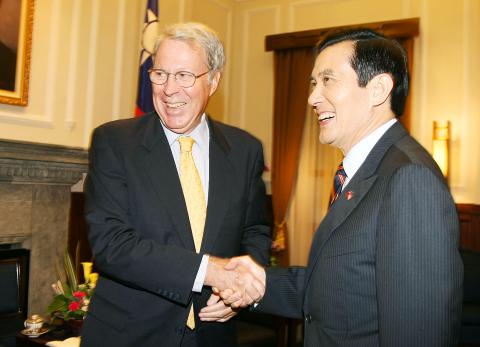President Ma Ying-jeou (馬英九) yesterday reiterated his call on the US to sell F-16C/D aircraft to Taiwan during a meeting with American Institute in Taiwan (AIT) Chairman Raymond Burghardt and emphasized the importance of maintaining a balance of military strength across the Taiwan Strait.
The procurement of weapons conforms to the Taiwan Relations Act, Ma said, adding that the fighter aircraft would replace an aging fleet and would only be used for defensive purposes.
“The defense budget failed to reach 3 percent of GDP, but that budget is still more than the budget for last year ... The government will continue efforts to make sure the budget for national defense meets demands,” Ma said at the Presidential Office.

Photo: CNA
According to official figures, the defense budget last year was NT$297.4 billion (US$9.3 billion), compared with NT$297.2 billion this year. However, when asked for clarification, the Presidential Office told the Taipei Times that once subsidies for veterans’ housing and other expenditures not directly related to defense were factored in, the total budget for this year was NT$374.8 billion.
Burghardt, who arrived in Taipei on Sunday for a five-day visit, remained noncommittal on the 66 F-16C/Ds requested by Taipei and said he “didn’t come this time with any kind of special message from Washington.”
In his meeting with Democratic Progressive Party Chairperson Tsai Ing-wen (蔡英文) on Monday, Burghardt said that arms sales to Taiwan would continue, while describing the fighter aircraft sale as “an old subject.”
Ma, who said Washington has remained unwilling to accept a letter of request for the F-16C/Ds, thanked the US for releasing two arms procurement packages in 2008 and last year — both leftovers from former US president George W. Bush’s administration — to help Taiwan maintain its necessary defense capabilities.
Ma also thanked the US for assisting in Taiwan’s plan to join the International Civil Aviation Organization, saying air travel was becoming increasingly important now that the number of weekly cross-strait flights has increased from 370 to 558.
He also pointed to what he referred to as achievements in improving cross-strait relations and said the two sides would address issues such as investment protection, a dispute-resolution mechanism and nuclear security in cross-strait negotiations later this year.
Commenting on January’s presidential and legislative elections, Burghardt said the AIT congratulated Taiwan for its success in developing a real democracy and said that the US remained neutral on Taiwan’s elections.

MAKING WAVES: China’s maritime militia could become a nontraditional threat in war, clogging up shipping lanes to prevent US or Japanese intervention, a report said About 1,900 Chinese ships flying flags of convenience and fishing vessels that participated in China’s military exercises around Taiwan last month and in January last year have been listed for monitoring, Coast Guard Administration (CGA) Deputy Director-General Hsieh Ching-chin (謝慶欽) said yesterday. Following amendments to the Commercial Port Act (商港法) and the Law of Ships (船舶法) last month, the CGA can designate possible berthing areas or deny ports of call for vessels suspected of loitering around areas where undersea cables can be accessed, Oceans Affairs Council Minister Kuan Bi-ling (管碧玲) said. The list of suspected ships, originally 300, had risen to about

DAREDEVIL: Honnold said it had always been a dream of his to climb Taipei 101, while a Netflix producer said the skyscraper was ‘a real icon of this country’ US climber Alex Honnold yesterday took on Taiwan’s tallest building, becoming the first person to scale Taipei 101 without a rope, harness or safety net. Hundreds of spectators gathered at the base of the 101-story skyscraper to watch Honnold, 40, embark on his daredevil feat, which was also broadcast live on Netflix. Dressed in a red T-shirt and yellow custom-made climbing shoes, Honnold swiftly moved up the southeast face of the glass and steel building. At one point, he stepped onto a platform midway up to wave down at fans and onlookers who were taking photos. People watching from inside

Japan’s strategic alliance with the US would collapse if Tokyo were to turn away from a conflict in Taiwan, Japanese Prime Minister Sanae Takaichi said yesterday, but distanced herself from previous comments that suggested a possible military response in such an event. Takaichi expressed her latest views on a nationally broadcast TV program late on Monday, where an opposition party leader criticized her for igniting tensions with China with the earlier remarks. Ties between Japan and China have sunk to the worst level in years after Takaichi said in November that a hypothetical Chinese attack on Taiwan could bring about a Japanese

The WHO ignored early COVID-19 warnings from Taiwan, US Deputy Secretary of Health and Human Services Jim O’Neill said on Friday, as part of justification for Washington withdrawing from the global health body. US Secretary of State Marco Rubio on Thursday said that the US was pulling out of the UN agency, as it failed to fulfill its responsibilities during the COVID-19 pandemic. The WHO “ignored early COVID warnings from Taiwan in 2019 by pretending Taiwan did not exist, O’Neill wrote on X on Friday, Taiwan time. “It ignored rigorous science and promoted lockdowns.” The US will “continue international coordination on infectious